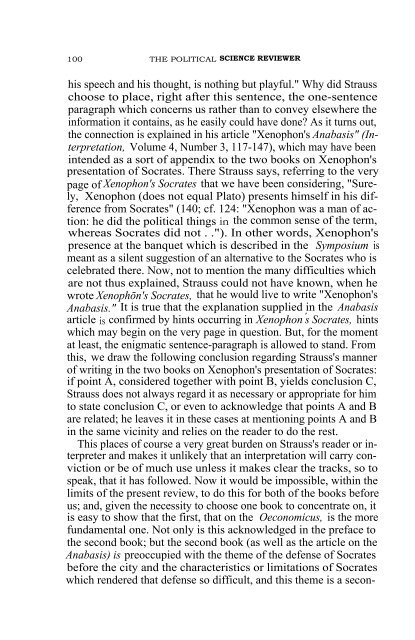Strauss on Xenophon's Socrates Xenophon's Socratic Discourse: An ...
Strauss on Xenophon's Socrates Xenophon's Socratic Discourse: An ...
Strauss on Xenophon's Socrates Xenophon's Socratic Discourse: An ...
Create successful ePaper yourself
Turn your PDF publications into a flip-book with our unique Google optimized e-Paper software.
100 THE POLITICAL SCIENCE REVIEWER<br />
his speech and his thought, is nothing but playful." Why did <str<strong>on</strong>g>Strauss</str<strong>on</strong>g><br />
choose to place, right after this sentence, the <strong>on</strong>e-sentence<br />
paragraph which c<strong>on</strong>cerns us rather than to c<strong>on</strong>vey elsewhere the<br />
informati<strong>on</strong> it c<strong>on</strong>tains, as he easily could have d<strong>on</strong>e? As it turns out,<br />
the c<strong>on</strong>necti<strong>on</strong> is explained in his article "Xenoph<strong>on</strong>'s <strong>An</strong>abasis" (Interpretati<strong>on</strong>,<br />
Volume 4, Number 3, 117-147), which may have been<br />
intended as a sort of appendix to the two books <strong>on</strong> Xenoph<strong>on</strong>'s<br />
presentati<strong>on</strong> of <strong>Socrates</strong>. There <str<strong>on</strong>g>Strauss</str<strong>on</strong>g> says, referring to the very<br />
page of Xenoph<strong>on</strong>'s <strong>Socrates</strong> that we have been c<strong>on</strong>sidering, "Surely,<br />
Xenoph<strong>on</strong> (does not equal Plato) presents himself in his difference<br />
from <strong>Socrates</strong>" (140; cf. 124: "Xenoph<strong>on</strong> was a man of acti<strong>on</strong>:<br />
he did the political things in the comm<strong>on</strong> sense of the term,<br />
whereas <strong>Socrates</strong> did not . ."). In other words, Xenoph<strong>on</strong>'s<br />
presence at the banquet which is described in the Symposium is<br />
meant as a silent suggesti<strong>on</strong> of an alternative to the <strong>Socrates</strong> who is<br />
celebrated there. Now, not to menti<strong>on</strong> the many difficulties which<br />
are not thus explained, <str<strong>on</strong>g>Strauss</str<strong>on</strong>g> could not have known, when he<br />
wrote Xenophōn's <strong>Socrates</strong>, that he would live to write "Xenoph<strong>on</strong>'s<br />
<strong>An</strong>abasis." It is true that the explanati<strong>on</strong> supplied in the <strong>An</strong>abasis<br />
article is c<strong>on</strong>firmed by hints occurring in Xenoph<strong>on</strong> ' s <strong>Socrates</strong>, hints<br />
which may begin <strong>on</strong> the very page in questi<strong>on</strong>. But, for the moment<br />
at least, the enigmatic sentence-paragraph is allowed to stand. From<br />
this, we draw the following c<strong>on</strong>clusi<strong>on</strong> regarding <str<strong>on</strong>g>Strauss</str<strong>on</strong>g>'s manner<br />
of writing in the two books <strong>on</strong> Xenoph<strong>on</strong>'s presentati<strong>on</strong> of <strong>Socrates</strong>:<br />
if point A, c<strong>on</strong>sidered together with point B, yields c<strong>on</strong>clusi<strong>on</strong> C,<br />
<str<strong>on</strong>g>Strauss</str<strong>on</strong>g> does not always regard it as necessary or appropriate for him<br />
to state c<strong>on</strong>clusi<strong>on</strong> C, or even to acknowledge that points A and B<br />
are related; he leaves it in these cases at menti<strong>on</strong>ing points A and B<br />
in the same vicinity and relies <strong>on</strong> the reader to do the rest.<br />
This places of course a very great burden <strong>on</strong> <str<strong>on</strong>g>Strauss</str<strong>on</strong>g>'s reader or interpreter<br />
and makes it unlikely that an interpretati<strong>on</strong> will carry c<strong>on</strong>victi<strong>on</strong><br />
or be of much use unless it makes clear the tracks, so to<br />
speak, that it has followed. Now it would be impossible, within the<br />
limits of the present review, to do this for both of the books before<br />
us; and, given the necessity to choose <strong>on</strong>e book to c<strong>on</strong>centrate <strong>on</strong>, it<br />
is easy to show that the first, that <strong>on</strong> the Oec<strong>on</strong>omicus, is the more<br />
fundamental <strong>on</strong>e. Not <strong>on</strong>ly is this acknowledged in the preface to<br />
the sec<strong>on</strong>d book; but the sec<strong>on</strong>d book (as well as the article <strong>on</strong> the<br />
<strong>An</strong>abasis) is preoccupied with the theme of the defense of <strong>Socrates</strong><br />
before the city and the characteristics or limitati<strong>on</strong>s of <strong>Socrates</strong><br />
which rendered that defense so difficult, and this theme is a sec<strong>on</strong>-

















